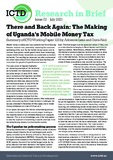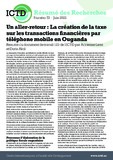There and Back Again: The Making of Uganda’s Mobile Money Tax
Un aller-retour : La création de la taxe sur les transactions financières par téléphone mobile en Ouganda
| dc.contributor.author | Lees, Adrienne | |
| dc.contributor.author | Akol, Doris | |
| dc.coverage.spatial | Uganda | en |
| dc.date.accessioned | 2021-10-07T15:15:42Z | |
| dc.date.available | 2021-10-07T15:15:42Z | |
| dc.date.issued | 2021-07 | |
| dc.identifier.citation | Lees, A. and Akol, D. (2021) 'There and Back Again: The Making of Uganda’s Mobile Money Tax', ICTD Research in Brief 72, Brighton: Institute of Development Studies | en |
| dc.identifier.uri | https://opendocs.ids.ac.uk/opendocs/handle/20.500.12413/16873 | |
| dc.description.abstract | Mobile money is widely seen as a powerful tool for enhancing financial inclusion and, potentially, improving the economic well-being of the poor. As the mobile money sector, and its turnover, have grown, certain governments have increasingly viewed mobile money transactions as a potentially convenient tax handle. The resulting tax measures are often controversial and draw sharp criticism from those who fear that they will undermine the growth of digital financial services. The case study of Uganda highlights an interesting example of this trend and demonstrates the importance of careful tax policy design. In early 2018, there was a consensus that Uganda’s tax effort remained some way below its revenue potential, and there was pressure to find new revenue sources. In July 2018, the government introduced an especially contentious new tax of 1 per cent on the value of all mobile money transactions, one of several excise duty amendments designed to increase revenue from the telecommunications and financial sectors. After widespread public outcry and significant implementation challenges, the tax was amended in November 2018 to apply only to mobile money withdrawals at a rate of 0.5 per cent. | en |
| dc.description.abstract | La transaction financière par téléphone mobile (Mobile money) est largement considérée comme un outil puissant pour renforcer l’inclusion financière et, potentiellement, améliorer le bien-être économique des personnes démunies. Au fur et à mesure que le secteur du mobile money et son chiffre d’affaires se sont développés, certains gouvernements ont progressivement considéré les transactions par mobile money comme un moyen potentiellement pratique pour gérer les taxes. Cela dit, les mesures fiscales qui en découlent sont souvent controversées et suscitent de vives critiques de la part de ceux qui craignent qu’elles ne compromettent la croissance des services financiers numériques | fr |
| dc.language.iso | en | en |
| dc.publisher | Institute of Development Studies | en |
| dc.relation.ispartofseries | ICTD Research in Brief;72 | |
| dc.rights.uri | http://creativecommons.org/licenses/by-nc/4.0/ | en |
| dc.subject | Finance | en |
| dc.title | There and Back Again: The Making of Uganda’s Mobile Money Tax | en |
| dc.title | Un aller-retour : La création de la taxe sur les transactions financières par téléphone mobile en Ouganda | fr |
| dc.type | Series paper (non-IDS) | en |
| dc.rights.holder | Institute of Development Studies | en |
| rioxxterms.funder | Default funder | en |
| rioxxterms.identifier.project | Default project | en |
| rioxxterms.version | VoR | en |
| rioxxterms.funder.project | 9ce4e4dc-26e9-4d78-96e9-15e4dcac0642 | en |



